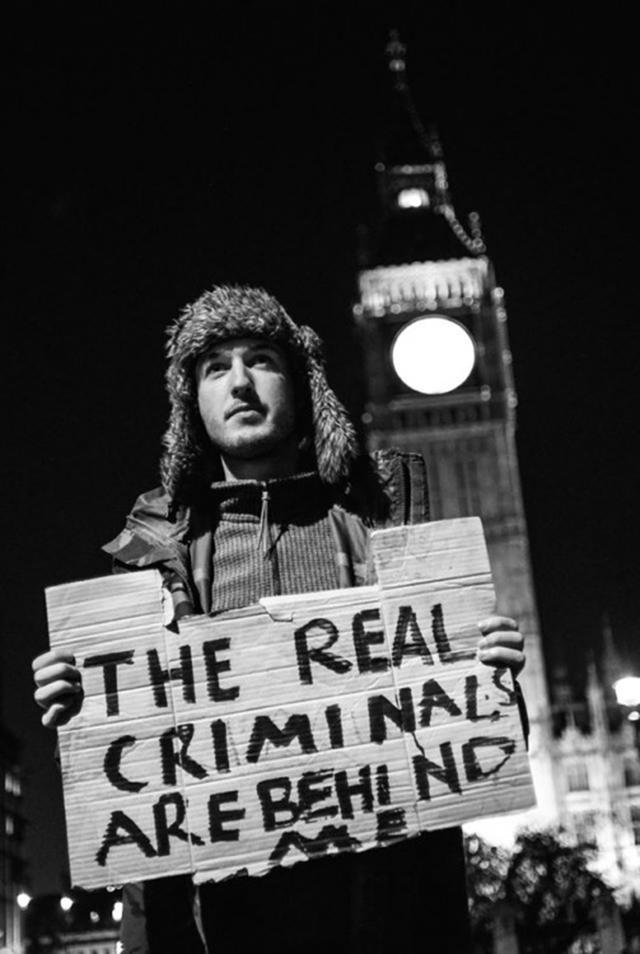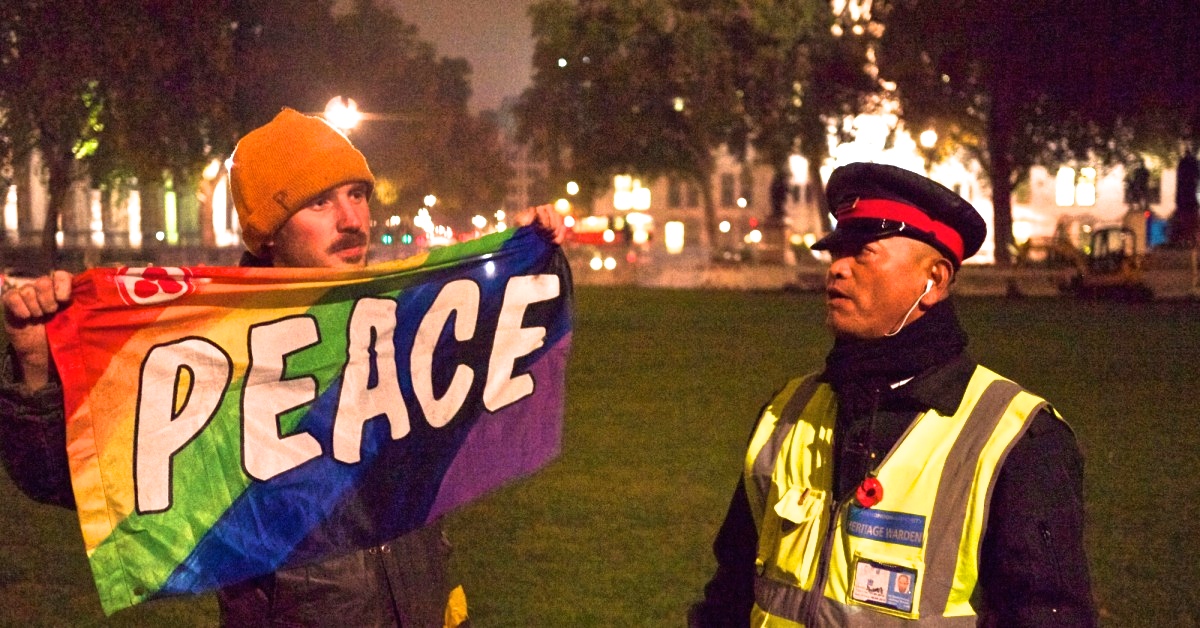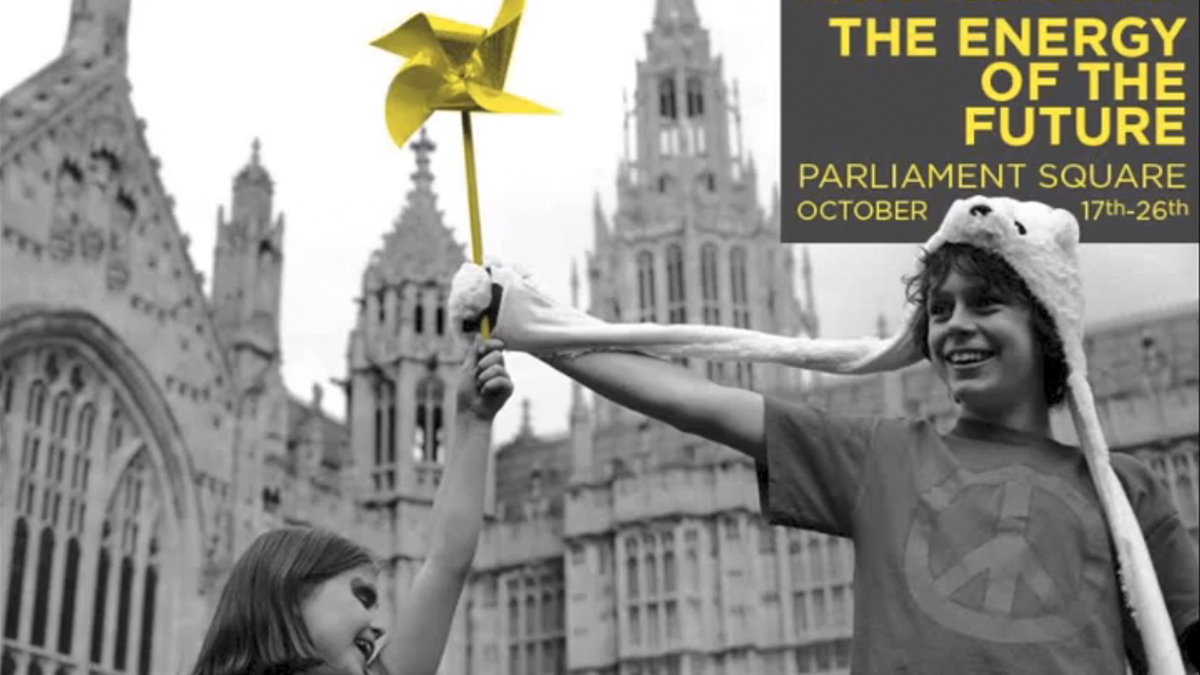It is a crisp, clear autumn afternoon in London. About two hundred Occupy activists are huddled on the outskirts of Parliament Square, opposite the Houses of Parliament. Another 10 or so are standing down at street level holding banners up for the benefit of passing cars and pedestrians, prompting a soundtrack of beeps, honks and rallying cries.
Parliament Square itself is out of bounds to the group: according to a sign attached to the fence now surrounding it, it is “closed for repairs,” although Scotland Yard has admitted that protestors sleeping on the square were the catalyst for the decision to shut it. A number of arrests have been made for obstruction, with a widespread media outcry provoked when some protesters were jailed for bringing food and liquid to another protester who had installed himself on a plinth and refused to come down.
The protesters have gathered for 10 days at Occupy Democracy to express their displeasure with the state of UK politics – including government's aggressive push for fracking, increased privatization of the National Health Service, cuts to services for the elderly and disabled, and a catalog of other unpopular policies.
On this particular afternoon there are speeches from Labour MP Michael Meacher, HSBC Bank whistleblower Everett Stern, and The Revolution Will Be Televised presenter Jolyon Rubenstein, among others. “Why should we trust politicians?” an audience member hisses in Meacher's direction as he steps up to speak.
“I can see why people don't,” Meacher quietly responds. “As politicians we have a responsibility to give people something to vote for and that just isn't happening. Most politicians go straight from Oxbridge to an internship in the House, to working for an MP and then to being an MP themselves. They don't understand what it's like to come from a different background – to be part of this big crushed underclass we now have, which can't even be described as 'aspiring working class' because the jobs just aren't there for them.”
Stern, a former compliance officer who exposed Britain's HSBC for money laundering when he revealed the bank's multi-billion-dollar scam in 2010, draws an enthusiastic crowd to Occupy Democracy. “Half of all the high street stores were involved,” he explains. “About 500,000 to 600,000 people were affected but you won't hear about it on the BBC. HSBC, look at my website, www.everettstern.com, to see what I've written. I put in a complaint to them but they just don't know how to deal with me.”
“What can we do to help you get this dealt with properly?” an audience member asks.
“Organize protests! Help me close HSBC down!” shouts the whistleblower.
Green Party London Assembly member Baroness Jenny Jones, a longtime supporter of Occupy, was among the numerous activists taken into custody during the course of the 10-day occupation outside Parliament Square. She tells Occupy.com, “I joined the protesters because I felt they had a very valid point in that we don't have much democracy, as was then evidenced by all the arrests. I went down on Monday with flasks of tea because it was really cold. Then on Wednesday, I was asked by my office – as well as a friend who was a protester there – to go down and check out the heavy-handed policing.”
Ironically, Jones herself then got arrested. “I think it's appalling that they've shut the square off,” she continues. “It's a perfect location for a protest. It's easy for parliamentarians to get totally divorced from what's happening in people's lives and it's very important they listen to protests. The bylaws that allowed [the square's closure] to happen need to be repealed as soon as possible. The right to protest is a fundamental human right, especially in Britain where we have a strong tradition, a strong heritage, of protest.”
One protester calling herself Rainbow says, “I come here to meet my sane friends, that's the best way of putting it. I don't know if it will have any effect on Parliament to see us here – if they're even looking – but I feel better just being among like-minded people.”
Another man, who withholds his name, says he works "round the corner and wasn't intending to come down and get involved, but my curiosity got the better of me."
"When I got here I realized that I really did empathize with the protesters," he adds. "Defending the working classes is so important right now. They're the real workers of the world and they are being screwed over by lazy politicians who aren't doing the job people elected them to do.”
Pedro, a protester from Portugal who has lived in London for three years, says, “Democracy is a farce at the moment and the people who are voted in just aren't a proper cross-section. They're all from the same demographic. About 75% of them are Oxbridge-educated, but most people in this country don't even know someone who has been to Oxford or Cambridge.”
Occupy, he feels, is a chance for people from all walks of life to demand, well, that other people from all walks of life get the chance to act as their political representatives. “If you look round here,” Pedro continues, “I think you'll find a really diverse mix off people. It really is the 99% having a voice. [And] it's really symbolic that they've shut off Parliament Square – a place where lots of big protests have happened over the years, the suffragettes campaigning for the vote for women, for instance.”
The occupation of the square, which received scant media attention, ended Oct. 26. Many organizers have now moved the action over to Putney in South West London, where a program entitled “The New Putney Debates” is taking place through Nov. 16. Subjects include the pros and cons of introducing a basic income, effective tactics of debt resistance, analyses of capitalism and its effects on society, right for the disabled, and sustainability issues. All events are free and attendance is open to the public with registration required first. Full details and program available here.

3 WAYS TO SHOW YOUR SUPPORT
- Log in to post comments


















